QuestionThank you very much for your response...I will take your advice, I just was a little confused because it was the doctor at the VCA Animal Hospital that told me to make sure my rabbit get fed fresh greens daily! The doctor sort of scolded me like I was not taking the proper care of my bunny. Again, thanks for your response...Aloha from Hawaii.
-------------------------
Followup To
Question -
First of all, my bunny never did make perfectly round droppings. The first time he had a pretty bad case of diarrhea, I rushed him to VCA animal hospital where I was informed after x-rays that my baby had hairballs in his stomach. After the special diet of baby food & pedialyte and anti-biotics he was back to normal. At that time I used to give him a plateful of romaine & broccoli. That was maybe 2 yrs ago, (he's about 3yrs now) I started to give him very little (1/4 of a romaine leaf), broccoli & brussel sprouts. Well that didn't work, he'd still have diarrhea (not at whole lot) and started to really cut down his pellets so he was forced to eat his hay. He absolutely hates it when I have to force the rabbit oitment in his mouth. I only give him brussel sprouts & broccoli before his pellets but still has little diarrhea. This is the first time that it's been continous, he's in excellent condition & spririt (he's a spoiled house bunny..no he does not get any table food) but need advice on what to do. Really appreciate your time & advice.
Answer -
Ms. Beasley, I believe you said it best...."he's a spoiled house bunny"..and in your desire to be a good owner, you have been entirely too generous with his diet. You will not want to hear this, but the best resolution long term to allow him to live to his maximum potential (about 8-10 years) is to feed him ONLY 16% (protein) rabbit pellets, water, and some good alfalfa hay. (Rye, fescue, orchardgrass and bermuda hay are OK, but have less protein.). If you do without the hay, there is still enough fiber in the pellets to suffice. The broccoli, brussel sprouts, etc. have too much liquid in them.
An understanding of digestion would explain that the bodies are developed to digest food based upon precedent. Wild rabbits are, from their first mouthful of food, conditioned to eat succulents. This, they would not do well with pellets. Domestic rabbits always start as babies with pelleted first feed. Later changes cause them diarrhea problems, and clearly, that is a problem for him. Again, I'd focus on his 'quality of life' issues being good and regular interaction with you, and a nice place to live, rather than having a varied and complex diet.
I am not a House Rabbit person, but have raised hundreds of bunnies every year, and have had NO diarrhea, No colds, No illnesses of any kind for years. My bunnies may not have the quality of life that your guy has, but they are really healthy.
My herd of rabbits are in all wire cages (No wood anywhere), all cages are in a single tier (no stacking), manure pits are 3 feet below them and are cleaned out weekly, each rabbit has their own nipple from an automatic watering system, and they have a breeze flowing through their own dedicated 16' by 36' rabbitry building. Air comes from the outside deep woods via 4 foot by 24 foot open windows covered by chainlink fencing, and they have two fans going constantly in the other direction, one of the fans is 48" wide. No treats..yea, I'm not much into that, but they get fed(4 measured ounces of feed only) and are checked every day, their water is always crystal clear, and the only stress they have is when one of the llamas starts staring at them from outside the building.
I do regulate light all year, so they have 14 hours of daylight even in winter. That keeps them regular, and they reproduce all year long, whereas unregulated light would slow down reproduction in winter months.) You are just going to reach a level of nutritional care that you are comfortable with..but please don't be too generous with the extra feeds...as you have discovered, it just is not worth the long term problems. I hope some of this was useful to you.
Regards, Steve
AnswerThanks. A little background.... I have a BS in Animal Science, an MS in Agricultural Education, a Ph.D. in Int'l Development (Lived in Amman, Jordan and taught them to raise rabbits commercially (for food) for my dissertation).
I am sure your vet is capable, but is uneducated in the deeper intricacies of rabbit physiology and nutrition. Probably hasn't ever raised a rabbit either, which does make a difference. Like many vets, when they encounter something for the first time, they fall back on a broad base of information that sometimes doesn't fit. For instance, he/she probably doesn't know a little known rabbit fact... nutritionally, all domestic rabbits practice coprophagy, and they eat their own soft feces late at night, (anus to mouth) and these specific excreta are rich in Vitamin B, a substance that rabbits cannot otherwise digest..thus diarrhea also results not only in dehydration, but also causes them to have a severe vitamin B deficiency.
Also, unless a vet has certain passion for a specific species, they only look up details in a reference.(usually in a Merck Veterinary Manual- ~$50, best desk reference for animals, ever, and they all have one in a top drawer in their desks. When a new vet problem arises, they sneak off and read it quickly.) Any way, as a result of this conversation,I hope and expect that you have a healthy and long lived bunny.
I suppose our special backgrounds and their in-depth screening is why each 'expert reference' from "ALLEXPERTS" has pretty good credibility. (We all do this totally for free, because we love our individual subjects.) Anyway, Ms. Beasley of Hawaii, Best wishes for a long, happy life, from Dr. Steve in Georgia. Bye!

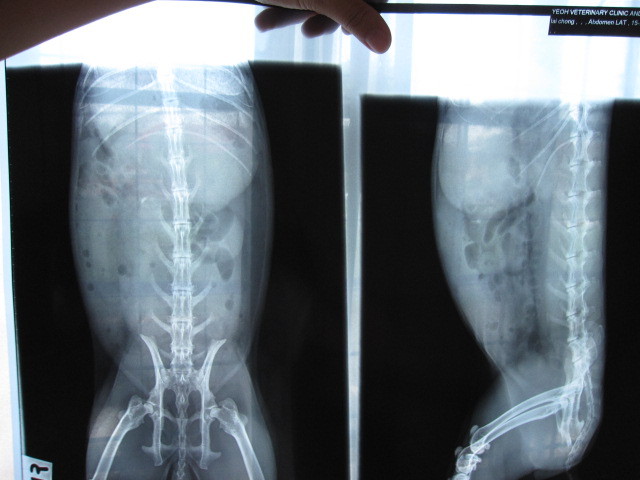 Thank you: my rabbit suspected of intestine rupture/blockage is fine
QuestionQUESTION: Hi,
my rabbit is currently hospitali
Thank you: my rabbit suspected of intestine rupture/blockage is fine
QuestionQUESTION: Hi,
my rabbit is currently hospitali
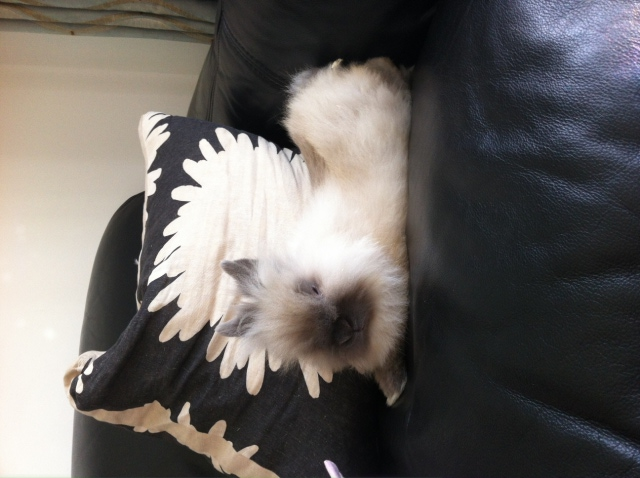 One Rabbit or Two
QuestionQUESTION: Hi Cat, I am reading conflicting view
One Rabbit or Two
QuestionQUESTION: Hi Cat, I am reading conflicting view
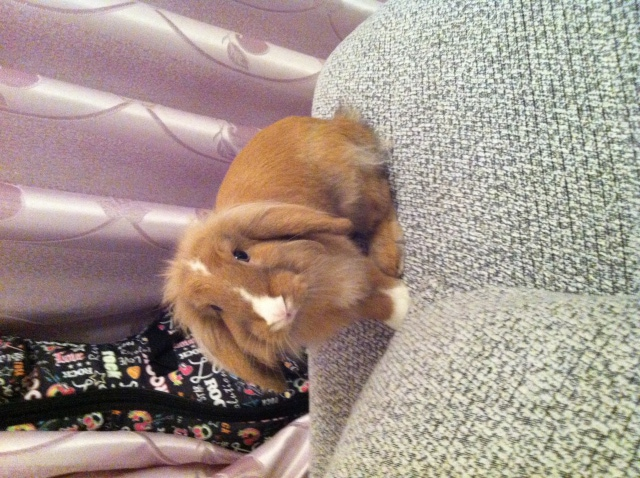 My rabbits diet
QuestionChocolate
QUESTION: Hi cat.. I have a mi
My rabbits diet
QuestionChocolate
QUESTION: Hi cat.. I have a mi
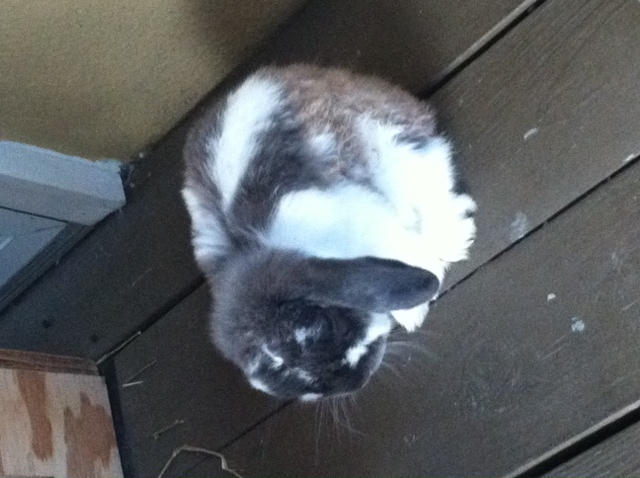 Scab-ish growth on my rabbits ear?
Question
Rhino Right outer ear
Hello!
Ill
Scab-ish growth on my rabbits ear?
Question
Rhino Right outer ear
Hello!
Ill
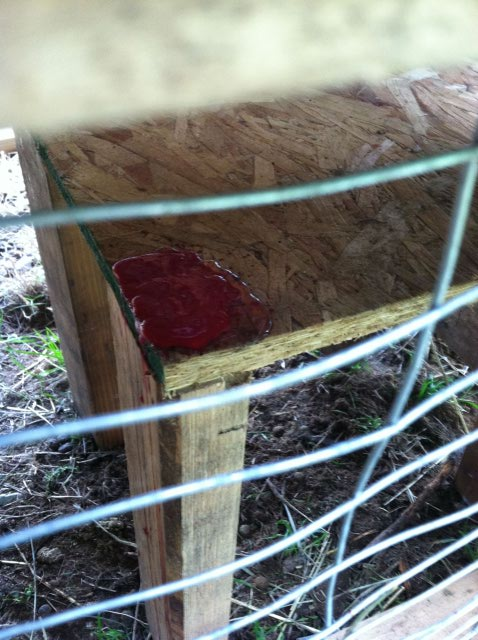 Bleeding Rabbit - from mouth
QuestionBlood Pool
QUESTION: This morning my dau
Bleeding Rabbit - from mouth
QuestionBlood Pool
QUESTION: This morning my dau